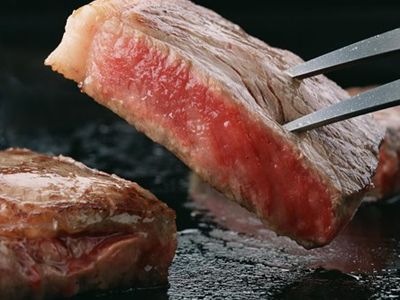Beef is a bovine meat. The cow is a ruminant animal, which is derived from the domestication of the buffalo. It can be divided into three kinds: yellow cattle, calves and buffalo. Beef is the second largest meat food in the Chinese, second only to pork. Its protein content is higher than that of pork, but its fat and cholesterol levels are lower than those of pork.
Beef contains iron for hematopoiesis; zinc, can promote muscle growth and enhance muscle strength; vitamin B6, can enhance immunity ... ... compared to fish, pork, beef has its unique benefits.

1, beef contains potassium and protein
Potassium is a mineral that is relatively lacking in the diet of most athletes. Low levels of potassium inhibit protein synthesis and the production of growth hormone, which affects muscle growth. Beef is rich in protein: 4 ounces of lean loin can produce 22 grams of first-class protein.
2. Beef is a low fat source of linoleic (oil food) acids
Beef has a low fat content, but it is rich in linoleic acid, and these potential antioxidants are effective against tissue damage caused by weightlifting and other sports. In addition, linoleic acid can also act as an antioxidant to keep muscle mass.
3, beef containing carnitine
The contents of carnitine and sarcosine in chicken and fish are very low, but the content of beef is high. Carnitine is mainly used to support the metabolism of fat and produce branched-chain amino acids. It is an amino acid (amino acid food) that plays an important role in the growth of bodybuilding (sports food) members.
4, beef contains zinc, magnesium
Zinc is another antioxidant that helps to synthesize proteins and promote muscle growth. Zinc works with glutamate and vitamin B6 to boost the immune system. Magnesium supports protein synthesis, increases muscle strength, and more importantly, improves the efficiency of insulin synthesis and metabolism.
5, beef contains alanine
The role of alanine is to produce sugar from the dietary protein. If you don't have enough carbohydrates, alanine can supply the muscles with the energy needed to ease the deficiencies and allow you to continue training. The biggest benefit of this amino acid is that it frees muscles from the burden of supplying energy (energy foods).
6, beef contains vitamin B12
Vitamin B12 is essential for the production of cells, and the role of red blood cells is to bring oxygen to muscle tissue. Vitamin B12 promotes the metabolism of branched-chain amino acids and provides the body with the energy needed for high-intensity training.
7. Diversification of beef consumption
If it is eaten day after day or even months, the chicken breast becomes annoying. Beef is different, and the hind legs, flanks, upper loins and thin slices of meat are all different in taste and texture, and it is indeed not the same as the boring chicken breast.